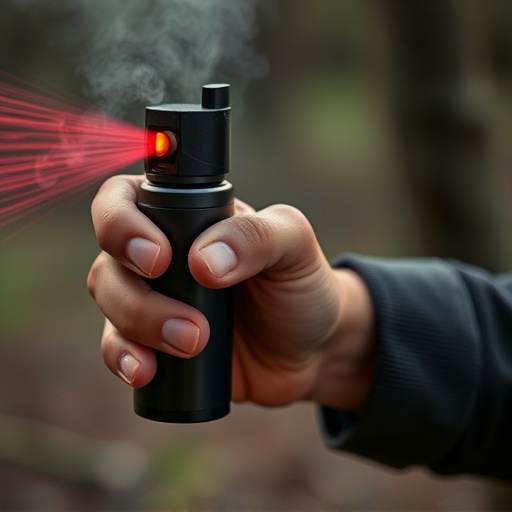To legally carry pepper spray, research and comply with local regulations regarding permits, training, spray specifications, storage, and usage guidelines. Obtain necessary permits after background checks and prove safe handling through certified courses. Keep pepper spray stored securely, out of reach of children, and away from extreme temperatures. Deploy the spray responsibly by aiming at attackers' faces or eyes, using minimal force, and having an escape route. Regularly review safety measures, practice deployment techniques, maintain the spray's functionality, and stay aware of your surroundings to ensure effective self-defense within legal boundaries.
“Uncover the power of maximum strength pepper spray as a legitimate self-defense tool. This comprehensive guide explores its effectiveness and navigates the legal framework surrounding its possession and use, varying by region. Learn the essential steps to legally carry pepper spray, from obtaining permits and training to ensuring compliance with local regulations. Discover safety considerations and gain valuable self-defense strategies, including effective deployment techniques and heightened situational awareness, to empower yourself in potentially dangerous situations. Master how to legally carry pepper spray with confidence.”
- Understanding Pepper Spray: Its Effectiveness and Legal Framework
- Requirements for Legal Carry: Permits, Training, and Compliance
- Safety Considerations: Responsible Use and Storage Guidelines
- Self-Defense Strategies: Effective Deployment Techniques and Situational Awareness
Understanding Pepper Spray: Its Effectiveness and Legal Framework
Pepper spray, a powerful personal defense tool, has gained widespread recognition for its ability to disable and deter potential attackers temporarily. It works by causing irritation and pain in the eyes, nose, and respiratory system, leading to temporary blindness and difficulty breathing. This simple yet effective mechanism makes pepper spray a popular choice for self-defense among individuals seeking protection in various situations, from walking home at night to dealing with unexpected assaults.
However, understanding the legal framework surrounding pepper spray is crucial before considering it as a defense mechanism. Different jurisdictions have varying regulations on who can possess and carry pepper spray, where it can be used, and under what circumstances. How to legally carry pepper spray depends on local laws and requires diligence in research and compliance. Knowing your rights and responsibilities ensures that you use this tool responsibly and avoid potential legal repercussions.
Requirements for Legal Carry: Permits, Training, and Compliance
To legally carry pepper spray, understanding and adhering to local regulations is paramount. Requirements vary by jurisdiction, but generally, obtaining a permit is mandatory. This process often involves background checks, proof of training, and demonstrating proficiency in using the spray safely and effectively. Many areas mandate specific types of training, such as those offered by certified self-defense instructors or law enforcement agencies.
Compliance with local laws extends beyond permits. Users must ensure their pepper spray meets certain criteria, including size, capacity, and active ingredients. Regular maintenance and proper storage are also crucial to remain in compliance. Always stay informed about the specific regulations in your area to avoid legal repercussions and ensure you’re prepared should the need arise.
Safety Considerations: Responsible Use and Storage Guidelines
When carrying pepper spray for self-defense, understanding and adhering to safety considerations is paramount. It’s crucial to know local laws regarding how to legally carry pepper spray, as regulations vary widely by region. Always consult your jurisdiction’s specific requirements to ensure compliance. Obtain a permit if needed and familiarize yourself with the legal implications of possession and use.
Responsible use guidelines include aiming directly at the attacker’s face or eyes, using only as much force as necessary to disable them, and ensuring you have an escape route post-use. Storage is equally important; keep pepper spray out of reach of children and in a secure, locked location. Avoid leaving it in your vehicle, as extreme temperatures can compromise its effectiveness. Regularly review safety measures with all household members or colleagues who may also be authorized to use the spray.
Self-Defense Strategies: Effective Deployment Techniques and Situational Awareness
In self-defense scenarios, pepper spray can be a powerful tool when deployed correctly. Understanding how to legally carry pepper spray is just the first step. Effective deployment techniques involve aiming for the face, eyes, and nose, where it will cause maximum irritation and disorientation. Practice with a dummy or target to improve accuracy and timing. Situational awareness is paramount; always stay alert and observe your surroundings. This includes identifying potential threats early, noting escape routes, and being mindful of nearby bystanders to ensure their safety. Regular training sessions can help refine these skills and make certain you’re prepared for any unexpected situation.
When using pepper spray, remember that it’s a last resort. Legal implications vary by region, so know the local laws regarding self-defense and the carrying of pepper spray. Always keep it readily accessible but out of sight to avoid unnecessary attention. Regularly check expiration dates and ensure the device is in proper working order. Staying informed and prepared can significantly enhance your ability to defend yourself effectively.
Pepper spray can be a powerful tool for self-defense when used responsibly and within legal boundaries. Understanding its effectiveness, learning how to obtain the necessary permits, and mastering safe handling and deployment techniques are essential steps. By adhering to local regulations and staying informed about legal carry requirements, individuals can ensure they are properly equipped to protect themselves while avoiding potential legal repercussions. Empowering yourself with knowledge is the first line of defense in any situation.
